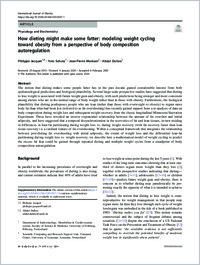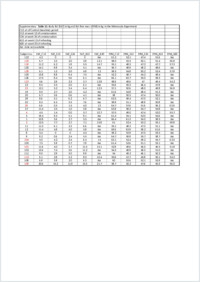How dieting might make some fatter: modeling weight cycling toward obesity from a perspective of body composition autoregulation
- Jacquet, Philippe Department of Endocrinology, Metabolism & Cardiovascular system, Faculty of Science & Medicine, University of Fribourg, Fribourg, Switzerland - Scientific Computing and Research Support Unit, Computer Center, University of Lausanne, Lausanne, Switzerland
- Schutz, Yves Department of Endocrinology, Metabolism & Cardiovascular system, Faculty of Science & Medicine, University of Fribourg, Fribourg, Switzerland
- Montani, Jean-Pierre Department of Endocrinology, Metabolism & Cardiovascular system, Faculty of Science & Medicine, University of Fribourg, Fribourg, Switzerland
- Dulloo, Abdul G. Department of Endocrinology, Metabolism & Cardiovascular system, Faculty of Science & Medicine, University of Fribourg, Fribourg, Switzerland
-
25.02.2020
Published in:
- International Journal of Obesity. - 2020, vol. 44, p. 1243-1253
English
The notion that dieting makes some people fatter has in the past decade gained considerable interest from both epidemiological predictions and biological plausibility. Several large-scale prospective studies have suggested that dieting to lose weight is associated with future weight gain and obesity, with such predictions being stronger and more consistent among dieters who are in the normal range of body weight rather than in those with obesity. Furthermore, the biological plausibility that dieting predisposes people who are lean (rather than those with overweight or obesity) to regain more body fat than what had been lost (referred to as fat overshooting) has recently gained support from a re- analysis of data on body composition during weight loss and subsequent weight recovery from the classic longitudinal Minnesota Starvation Experiment. These have revealed an inverse exponential relationship between the amount of fat overshot and initial adiposity, and have suggested that a temporal desynchronization in the recoveries of fat and lean tissues, in turn residing in differences in lean-fat partitioning during weight loss vs. during weight recovery (with fat recovery faster than lean tissue recovery) is a cardinal feature of fat overshooting. Within a conceptual framework that integrates the relationship between post-dieting fat overshooting with initial adiposity, the extent of weight loss and the differential lean- fat partitioning during weight loss vs. weight recovery, we describe here a mathematical model of weight cycling to predict the excess fat that could be gained through repeated dieting and multiple weight cycles from a standpoint of body composition autoregulation.
- Faculty
- Faculté des sciences et de médecine
- Department
- Département de Médecine
- Language
-
- English
- Classification
- Dietetics, nutrition
- License
- License undefined
- Identifiers
-
- RERO DOC 328425
- DOI 10.1038/s41366-020-0547-1
- Persistent URL
- https://folia.unifr.ch/unifr/documents/308368
Other files
Statistics
Document views: 153
File downloads:
- mon_hdm.pdf: 300
- mon_hdm_sm.pdf: 102

